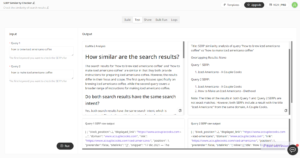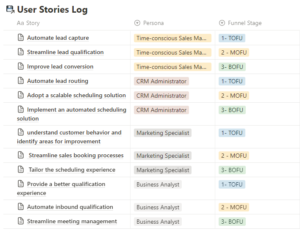Keyword research tools have historically helped with both ideation (finding keywords) and validation (reasoning to target them).
The problem today is that because keyword research tools are now mainstream, so are the keywords in the tools.
Pretty much every topic is already covered by high-authority sites.
So how can you actually find relevant topics to target that you can rank for?
In this post, I’ll be showing you my process for using AI for topic ideation and then validating content opportunities with competitive keyword data.
AI can help plan great topics that are relevant to your content goals. I then add a layer of validation with keyword tools.
It’s a fast and easy way to find ways to actually get your ideal customer to your website, helping drive growth.
The problem with keyword research tools
We all love keyword research tools. Whether you’re using Google keyword planner, Ahrefs, SEMrush, or any of the countless other keyword tools out there, they all have the same problem.
All the topics are covered. SEOing for these keywords has become mainstream. It can often feel like there are no good low-competition keywords left for you to get some traffic.
Where keyword tools go wrong:
Most marketers leverage keyword research tools to dictate their SEO strategy. They focus on one keyword, study the top-ranking content, and emulate it. However, many people don’t have a validation process, which is increasingly important due to high authority sites taking up the search real estate.
In reality:
Searchers spell things differently, put words in different orders, search for brand new terms, or search entirely different queries that essentially have the same meaning.
And there is no guarantee that there is specific content to match their query. Google will simply serve its best match for content that is likely to answer the query.
These days, Google’s search algorithms are advanced enough to understand that countless similar searches are looking for the same thing.
The solution: Replace ideation steps with AI
The data for keywords inside of your favorite tool is still awesome, the problem is the ideation. Everyone in your industry, especially the big players, is looking at the same recommended keywords offered within these platforms for content ideas.
To find real topic opportunities, you need to get out of your keyword tool.
Getting started with AI topic ideation
Instead of trying to identify keywords, think of why someone would be searching for your target keyword in the first place. Where are they in their user journey and what value can you offer them to assist?
AI tools like ChatGPT can do a great job of listing out all the problems people have quickly, saving you lots of time.

Step 1: Find problems
If you already have a list of common challenges your customers are facing before interacting with your business, you can use that as fuel for this step or even skip this step entirely.
If you’re unsure what challenges someone might be facing for a particular topic, which is often the case, ChatGPT is actually pretty helpful for most industries.
Prompt: “List all the problems or challenges someone might face when trying to start an online course business”
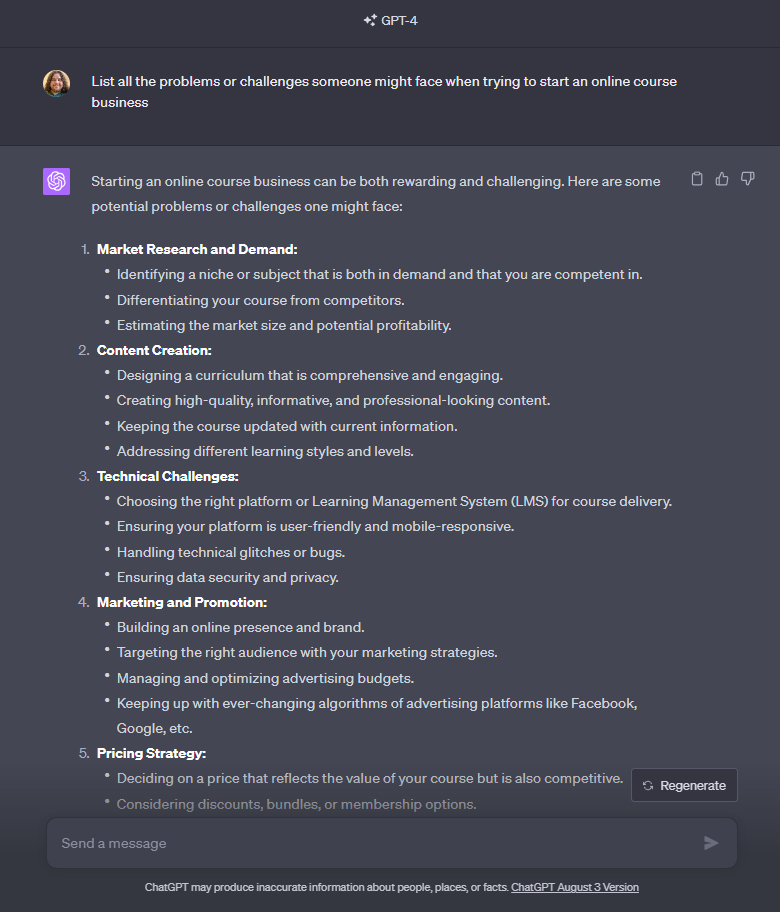
ChatGPT easily comes up with lots of problems. From technical limitations to pricing strategy and more. It came up with 15 very detailed and applicable problems on the first try.
You can stop here or continue down the problem rabbit hole to get an even more refined list.
Topics relevant to your business
Let’s say your business teaches people how to start an online course business by overcoming all these challenges.
If your business solves these problems for people, you have an opportunity to bring relevant and high-converting search traffic to your site.
By focusing on the problems or pain points people experience before buying your product or service, you will always be able to find great content ideas instead of having to settle for low relevance topics just to get traffic.
Step 2: Ideate with ChatGPT
Now that you have a list of problems. It’s time to ideate further with ChatGPT.
Your goal here is to try and identify common things someone would search for in their journey when experiencing a need to solve a problem.
So In ChatGPT, I take one problem, in this case, choosing an LMS, and I expand on it:
Prompt: List all the things someone would research if trying to solve this problem. What would they need to learn or do before solving their problem?
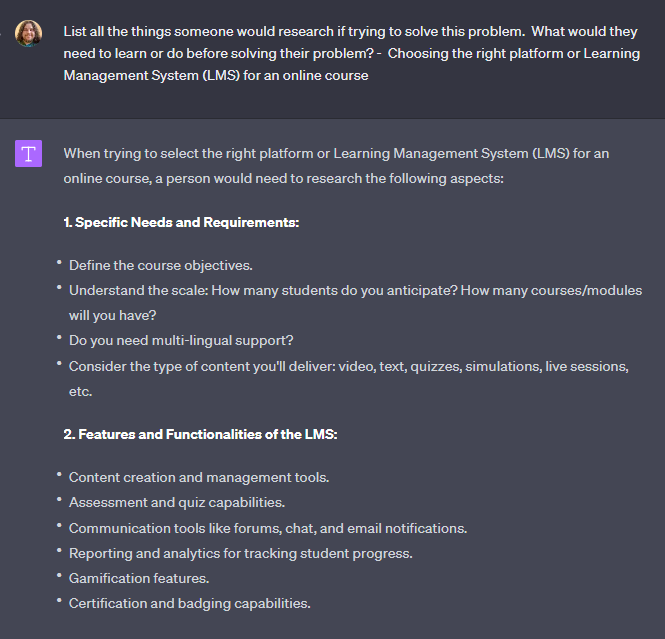
ChatGPT now gives me an expanded list of all the things people are likely researching if they are in the selection process of choosing an LMS. From assessing your needs to gamification and more.
This is starting to look kind of like keyword research. Only it’s focused much more closely on topics around your product or service, which is great for bringing in the right people.
Step 3: Validate on SERP
Now you have all the key ingredients:
1. A key topic relevant to your business (starting an online course business)
2. A list of problems someone might experience along the way (creating a website)
3. A list of things someone would search for to solve that problem (selecting an LMS)
This is starting to look like a content plan.
You only need one more key ingredient to make this work: Topic validation.
Before producing any content, you need to validate if there are topic opportunities and not just keyword opportunities.
You basically need to identify if there is search real estate you can go after.
Major topic validation pitfalls:
A lot of people don’t validate a content opportunity before sending it off to be written. This results in countless misses because of the high competition in today’s market.
Here are the main issues I’ve seen:
- Ignoring domain competition: Targeting keywords dominated by big websites is counterproductive for smaller sites. Many websites fail by not considering the domain rating (DR, AS, or DA) of competing sites. Think of DR as your level in a video game. A level 40 wouldn’t challenge a level 80. But this happens all the time on search engines.
- Not checking search intent: Marketers often produce content mismatched with the prevailing search intent, leading to no rankings. Because a lot of people never look outside of a keyword tool when planning topics and never study the Search Engine Results Page (SERP).
- Keywords over Topics: Most marketers target singular keywords, ignoring how a page ranks for hundreds and sometimes thousands of keywords. Tools lead them to sift through endless data, often missing broader topic opportunities.
- Relying on search volume: Search volume metrics in keyword research tools are largely guestimates based on a ton of different factors. Often times markers will overlook keywords because their keyword tool does not give them enough guestimate data to justify targeting something. Not considering that zero search volume keywords can still get plenty of traffic.
My SERP validation process
I can’t stress how important this step is. If you are going to spend upwards of $400 for a blog post, accuracy is important.
Competition is high, and we need to look at the SERPs to find a good placement, especially for a smaller website.
When I look at a SERP to validate a content topic idea. I simply take a problem from my list, such as choosing the right LMS, and search for it on Google.
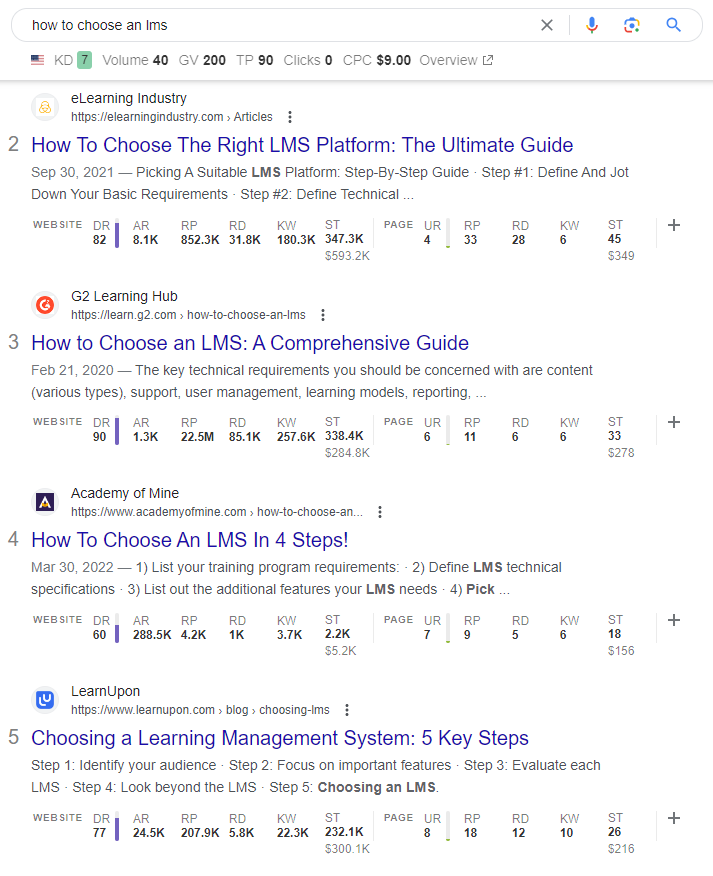
I also like to layer this with the Ahrefs Chrome extension so I can see metrics like DR, keywords, and page traffic. This helps me gauge if and where my site can fit on the SERP.
The difference: I’m using keyword research for validation instead of ideation.
You can validate with data however you like. I prefer doing it this way because I like to see exactly what kind of search result page I’m expecting to be able to rank on.
Bonus: Refining your search query
During this process, I’ll often run into instances where I find a better search term with the same intent, and I may refine my search to see what comes up. For example, if I search “how to choose an LMS”, I might refine that search to “best LMS.” It’s a simpler variation of the original with a higher search volume, which provides a more accurate depiction of the SERPs.
Note that during this process I’ll also change my location to the desired location of where I’m ranking. So if I’m going for a US national term, I’ll search from the US. Or if I’m trying to rank a page in Los Gatos California, I’ll search from Los Gatos. There are lots of tools to emulate your search location. My favorite is Isearchfrom. It’s fast, easy, free, and built by a real Google engineer.
In cases where I can’t validate an opportunity, let’s say the DR 80+ competition is too high for my DR 40 domain, I don’t give up there. I’ll simply go down another layer by adding one modifier.
It looks like “best LMS” is clearly oversaturated with top-ranking sites. What about “best LMS for selling courses”? This is arguably even more relevant to a company that teaches people how to start a business as most people don’t know how to code.
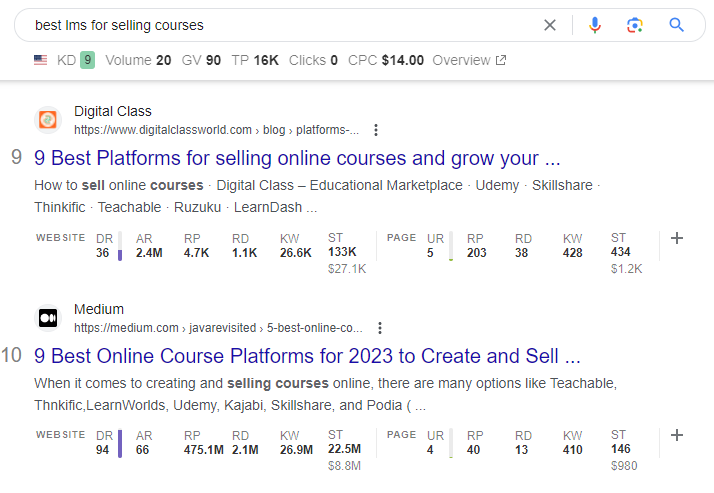
Here’s a DR 36 domain ranking for a topic typically reserved for DR 90 sites. I’m ignoring the position it ranks for because I’m looking for topics, not keywords.
Ahrefs estimates that this site is getting over 400 visits a month from relevant keywords, equating to over $1.2k in value on PPC cost alone. It likely gets more traffic than that.
By refining my search and adding modifiers, I can easily find topics in my range.
Watch out for false positives
Note that there are instances that can be deceiving. For example, medical topics. Doctors with no domain authority can rank for medical terms. You’re not going to be able to unless you have a high amount of medical experience, expertise, authority, and trust throughout your site. (EEAT).
Another common example is an exact match domain. These still have an easier time ranking for topics under their domain name umbrella and can be deceivingly difficult to outrank as a result.
Step 4: Plan your content and produce
In this example, I wouldn’t target emulating the top-ranking page for “best LMS”. I’d be targeting this DR 36 and creating a much better page than them for the best platforms for selling online courses. If my site has higher authority and my content is better, I can outrank the competitors.
This process shows you how to find highly relevant topics and then validate your ideas with competitive keyword data. It also shows you how you can build an entire content strategy around highly relevant topics.
This combines the best of both worlds. AI’s powerful creativity is a great replacement for crowded ideation tools, while still keeping all the best metrics from keyword tools.
Connect with me on LinkedIn or email me to share your thoughts.

